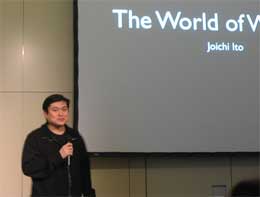 My notes from Joichi Ito‘s talk about his experience of and passion for World of Warcraft at 23C3 in Berlin.
My notes from Joichi Ito‘s talk about his experience of and passion for World of Warcraft at 23C3 in Berlin.
For Joichi Ito (uber-cool Japanese guy who was using his mobile phone to click from one slide to another), there’s a number of very interesting things that happening in World of Warcraft today. The game is not doing anything different than any other game, it just does it better. Besides a lot of things have changed and improved since the beginning of MMORPGs: the graphics are much better, people have high bandwidth, etc.
The main strenght of WOW is that today the game counts 8 million players (about half of them are Chinese). Other MMORPGs are still counting in hundreds of thousands of players. Counting millions of players means a lot: it means that you can talk about the game with your friends at school, you can bump into other players in the streets, etc. It wasn’t possible before, the game wasn’t mainstream enough. Now the game keeps growing. Faster and faster. Mods from the past were more about constraints, death and limitations.
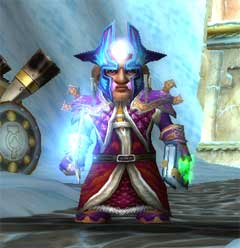 There’s one thing that people should stop asking is “Is WoW better than Second Life?” These are two very different things, it’s like companring apples and oranges. Joichi Ita plays both games. He even showed the screen where he displays videos of WOW inside SL, or explain how he would meet other WOW players for a quiet chat on SL and talk strategy with them.
There’s one thing that people should stop asking is “Is WoW better than Second Life?” These are two very different things, it’s like companring apples and oranges. Joichi Ita plays both games. He even showed the screen where he displays videos of WOW inside SL, or explain how he would meet other WOW players for a quiet chat on SL and talk strategy with them.
The total time Joichi Ito has spent playing so far is 108 days, 4 hours, 58 min, 55 seconds. The time played on his current level (level 60) is 72 days, 8 hours, 0 minutes, 41 seconds (that’s his avatar in full gear on the right.)
According to Richard Bartle, there are 4 types of pillars in MMORPGs:
– you play for Achievement (improving yourself, growing)
– Exploration (idea of quest, talks to the historians)
– Socialization (chat windows, guilds, etc.)
– Killing other players and monsters.
 People have their favourite pillar and it shows in the way they play. Some guilds focus on a specific pillar and others manage to balance them all. All the different ways people play are interesting but what’s even more fascinating is the way they interact.
People have their favourite pillar and it shows in the way they play. Some guilds focus on a specific pillar and others manage to balance them all. All the different ways people play are interesting but what’s even more fascinating is the way they interact.
He showed a kind of “raid group” where 40 players (5 from each of the WoW classes present in his guild) of his guild were attacking a super monster. “Now imagine you have to do something similar in real life, like getting 40 people together to go to a movie. It’s pretty tricky to organise. Now just think that you’d have to do that again and again, every weekend!”
He also recommended a paper on Massively Multiplayer Online Games by John Seely Brown and Douglas Thomas: The Play of Imagination: Beyond the Literary Mind. (get the PDF)
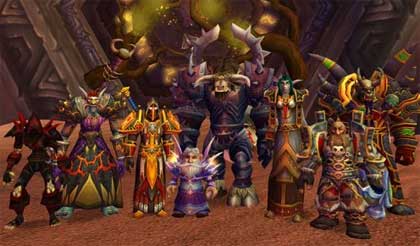
Metaphore of WoW for project management: the game can tell you a lot about how someone can work under stress, manage resources, move forward, etc. Ito explained that he had met all kinds of people who were great leaders on WoW (like a nurse on night shift in Virginia) but none of them had an MBA. (Related: an article about Why multiplayer games may be the best kind of job training.)
Seely Brown compared the experience of group activities on Wow to an “ensemble”, an orchestra. Being part of an ensemble means doing things or going places as a large group and seeing that everything works smoothly, fits into place like magic. Such as 40 people collaborating to kill a monster. Everyone has some sense of achievement, the satisfaction of having achieved something as part of a group.
In his guild there are all sorts of people: students, priests, policeman, businessmen… The game crosses the classes. That doesn’t happen to such extent on Second Life which is more a game for intellectuals. One of the reasons is that WoW has been designed as a commercial product. It’s not too expensive and you figure out quite rapidly how it works. It takes much more time to feel confident on SL.
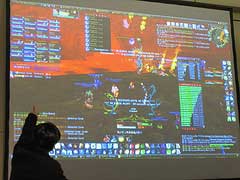 Joichi Ito talked about the importance of the user interface on WoW. His “dashboardâ€? is very impressive. Sascha wrote down a few notes about it on his blog: “According to him, it’s more like flying with instruments and the actual 3D realm becomes more of a background to the statistics he’s watching. So some runs require up to 40 players of level 60 each to cooperate, with an intricate rank-system, different skills, etc., everyone linked over audio and Joi in command. (I see that this is generating a lot of fuss in business circles with Yahoo allegedly considering applicants’ experience in WoW, because it’s all about solving problems and coordination and especially leadership. But – much more obvious, this is the future of war. Commanding 40 soldiers from a computer with complete overview of the relevant contexts is practically identical to what for instance the US army likes to call the digital battlefield, applied and working.)”
Joichi Ito talked about the importance of the user interface on WoW. His “dashboardâ€? is very impressive. Sascha wrote down a few notes about it on his blog: “According to him, it’s more like flying with instruments and the actual 3D realm becomes more of a background to the statistics he’s watching. So some runs require up to 40 players of level 60 each to cooperate, with an intricate rank-system, different skills, etc., everyone linked over audio and Joi in command. (I see that this is generating a lot of fuss in business circles with Yahoo allegedly considering applicants’ experience in WoW, because it’s all about solving problems and coordination and especially leadership. But – much more obvious, this is the future of war. Commanding 40 soldiers from a computer with complete overview of the relevant contexts is practically identical to what for instance the US army likes to call the digital battlefield, applied and working.)”
Richard Bartle argued that when you’re in a game, you’re in a fantasy and you don’t want reality to intrude. He was against VoIP.
Joichi Ito disagrees. In Japan, cyberspace is part of the real world. Besides, the integration of audio communication in the form of Teamspeak into the game doesn’t create any problem. It’s not a phone conversation, it’s more ambient, like being in the same room together. Team speakers have to “push to talk”. Sometimes people bump into each other but quickly learn how to handle that, even when there are 40 people in the same channel. For Ito, the transition between real world and game is seamless.
WoW is a fantastic place to meet people and have a chat with someone you wouldn’t talk with in real life: you find yourself talking with a priest about God for example. A guy from Joichi Ito’s guild has been beaten up by the lesbian girlfirend of the woman he was chatting up in a bar? First thing he does is talk about it to his team. WoW works as a wonderful watercooler. Players come from very different backgrounds as well which makes people embrace diversity. “Kids in the US don’t know much about diversity.” He told the story of a US kid who was racist but “how do you know that someone else in the guild is the same race as you?” Some actually learnt that yes, Chinese kids are pretty smart.
Outside tools of WoW: forums and bylaws that list the core values, missions, what you’re allowed to do or not in the guild, etc. His own guild, We Know, counts 400 members. It turns out that players in guilds which have nearly no rules are much more stressed than those playing in guild that have well-defined rules: in an organised guild, players know what to expect.
Another interesting outcome of WoW and online games in general is the use of game engine to create video content: Machinima.
He illustrated it with two videos:
Promo video for his World of Warcraft guild (hi-res direct download)
and the hilarious Machinima version of Electric six’ “Gay Bar”. Directed by the members of the Pretty Pink Ponies guild.
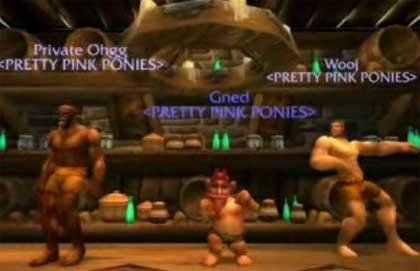
The problem is that WoW does not give players the right to use any of the stuff they make. On the other hand, Second Life is actually encouraging players to do Machinimas, they even have built-in features. If you want to use something, even a screenshot for an article that talks about the game you have to ask the authorisation to WoW’s lawyer department. WoW doesn’t understand much about the economy of sharing yet.
Another problem of WoW is that it is not the “new golf” as some have said, you cannot play with your mates if you’re not on the same server. Second Life, once again, does a better job here, each part of the SL universe is connected to others. It’s not flawless but it’s getting better.
He also mentioned the illegal practice of Gold Farming (farmers are very active in in China). But how do you get caught buying gold? If you offer a dinner to someone in exchange of gold or if you owe money to a friend and pays him back in gold. Technically it’s very difficult (if not impossible) to know if you’ve bought gold. Second Life has a Linden Dollar/US Dollar exchange. Blizzard is against the idea of allowing rich people to buy gold, they want an egalitarian system. The Chinese, strangely, believe that it would only be fair if the (real life) richest were also the most powerful in the game as well. Ito found it ironic that the idea of an egalitarian system should come from the US.
UPDATE: Joichi Ito has posted some preliminary videos here. More friendly video sites later maybe, he added.
See also the article Joichi Ito wrote about World of Warcraft for Wired.
I took pictures of some of his slides, they are not great (the pics not the slides) but there are some pretty good screenshots by Joichi Ito here, that’s were i stole the image of Ito’s avatar. Third image from Make Love Not Warcraft.
